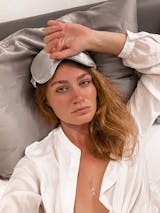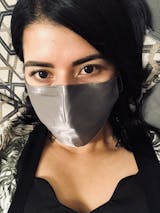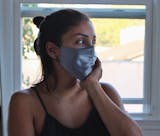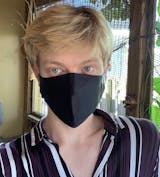When you purchase lotions and creams, you probably consider whether the brand is zero-waste, cruelty-free, Fair Trade Certified, and whether it sells organic products. However, one thing that may not cross your mind is whether the brand does any work to help save the bees.
You may ask, how are bees related to beauty and skincare?
In today’s blog, let’s discuss the link between bees and beauty products, and why the dwindling bee population is a cause of major concern. Then we’ll go over some ways in which we can all help the bees, and look at some brands that are going out of their way to help our bees and butterflies with eco beauty products.
An Eye-Opening VR Experience
If you don’t know about the bee problem, this VR experience by the European Commission is an excellent place to get started. It provides all the information you need through an engaging, powerful VR experience that will stay with you. It will take you about an hour to make your way through the biodomes and pick up information, but it’s worth every minute.
The experience is set in 2050’s in Europe. You enter a location called the Pollinator Park, which is an enclosed farm which provides a safe haven for several types of pollinators – bees, butterflies, moths, bumblebees and more.
As you “walk” around and learn about bees, you can collect diary fragments from the diary of Dr. Beatrice Kukac, the founder of this experience, and participate in interactive experiences like pollinating plants using a wand, picking up flowers, participating in a quiz, or shopping for food in a world without bees, all while pollinators flutter around you.
You can go to different venues such as Miro’s Meadow, The Farm, Hungry Hive, Urban Lab, and the Zoom Room – all of which serve different purposes, and provide information on different subjects.
The Dwindling Bee Population, and Their Importance
The VR experience will tell you a lot about this particular problem, but there are some things it doesn’t cover. So, to let you in on the full picture, here’s the basic stuff.
Bees are important because they’re one of nature’s most effective pollinators. Without pollination, plant propagation and seed-bearing would be an extremely labor-intensive process, to the extent where it may be impractical and impossible. So in short, bees are part of the reason why we have food.
There are over 2,000 wild bee species in Europe. The continent is home to 10% of the world’s bee species. However, because of urbanization, pesticide use, intensive agriculture, climate change, pollution, and invasive species such as the yellow-legged hornet, almost ten percent of their bee and butterfly population is threatened with extinction. About a third of the bee and butterfly population is declining – which is a staggering number.
In the US alone, there has been a 60% reduction in the number of bee hives from 1947-2008, and a 90% decrease in the number of bee colonies per hectare.
How will this affect humanity? According to Albert Einstein, the effect will be straightforward and drastic – if bees were to go extinct, we humans would be wiped off the face of the Earth within four years. Sounds a bit much? It may, but the facts are in front of you. A world without bees will be one not only lacking in beauty, but in many fruits, vegetables and other foods that we take for granted.
The Link Between Bees and Beauty
Bees directly impact the production of beauty products, because a lot of ingredients used in our lotions, serums, oils, and other products come from plant matter. Not only do plants need pollinators in order to flower and bear fruit (which is often the ingredient used), but they need pollinators in order to reproduce. In other words, without pollinators we’d soon run out of plants.
The VR experience showed us that without bees, our food options will be very limited. What it didn’t tell us, however, is that without bees and butterflies, we may not have access to beauty products, and many other items that we take for granted. And ultimately, without food, there will be no us.
How Can You Help Save the Bees?
Is all the negativity starting to get you down? Try channeling those emotions into something more productive. Here are some ways in which you, the individual, can help save our declining bee population. Not only are these tips simple and easy, but they’re also a great way to get children interested in nature. So in addition to supporting eco beauty companies, you can:
Plant bee-friendly flowers
We’ve said it before, and we’ll say it again – grass lawns are the worst. They use more water, and they do nothing to add beauty or to help the bees. Instead, plant your backyard thick with flowering trees and shrubs. Plant something for each season, so your little winged friends always have something to eat – crocus, hyacinth, lavender, cosmos, snapdragon, foxglove, zinnia, goldenrod, just to name a few.
Provide water
Bees need water to survive, so now’s the perfect time to install that birdbath you’ve had an eye on! It will benefit the local birds, bees and other little creatures, and provide them a respite from the heat. Make sure you change out the water daily, clean the birdbath regularly, and put in some stones, corks and twigs so your friends can land safely and avoid drowning.
Provide a custom-built home
If you want bees around all season long, consider making a bee hotel. There are various guides available online, but if you aren’t very handy, you can also just neglect a part of your garden, and it’ll slowly turn into a bee hotel! Long, un-mown grass, soil, plant stems and piles of sticks are all ideal homes for bees.
Avoid using pesticides
Most gardens will have pest problems at some point, and while it’s important to keep on top of issues and prevent them from spreading, try to avoid harsh pesticides as much as you can. Buy organic, pollinator-friendly products – they do just as good a job, without hurting our wonderful pollinators.
Buy organic
There are many agricultural practices that harm bees, and the best way to make a difference is by switching to organic produce. Stop buying fruit that’s been produced with the help of pesticides and intensive farming practices. Organic, local produce supports organic farmers, and enables them to do more to help the environment.
Buy ethically-produced honey
Many commercial honey producers exploit bees, doctor natural honey, and use forced breeding methods on queen bees. So, make sure the honey you buy is from an ethical brand that cares about its little workers – i.e., the bees.
Most of these take little or no effort – just a conscious decision. So, educate yourself, and decide that it’s time for a change – and then go out and make that change! And most importantly, spread the word. Educate others so the movement grows.
Five brands that are helping the bees
There are some eco beauty companies that realize the gravity of the situation. We went through the information and picked out the best of the best, and here they are below. So the next time you need to buy a beauty product, give your money to a company that does something good for the bees:
They have a 10-acre herb farm where they raise bees, and they produce and sell lots of amazing, bee-friendly products. Most of these – shampoo and lotion included – come in bar form, but for the few that do come in a tube, they sell a tube key, so you can get every last gram of the product out. Their handwash containers are refillable and reusable.
The company has been promoting pollinator health through education, research and conservation for the last 13 years. They have a zero waste production policy, they use energy efficient equipment, and they offset their emissions through conservation credits.
Neal’s Yard Remedies is Fair Trade Certified, and cruelty-free. They source honey sustainably from farms in Nicaragua and Mexico, and use it to create creams and cleansers. The brand has raised a significant amount of money for honeybee charities, and collected petitions that call for the ban of harmful insecticides.
They use organically sourced honey and other hive-derived ingredients in various products, such as their lip balm and facial cleanser. Their products are cruelty-free, and free from synthetic scents, flavors, parabens and petroleum-based products. They also sell some incredibly tasty whipped honey, which we think is a must-try.
The brand partners with holistic beekeepers in Hawaii, and adopts an all-natural approach. Every time you order a product, you get one that’s completely fresh and of the highest quality possible. They have simple and eco-friendly packaging that ensures the bees aren’t over-farmed or harmed in any way.
These are just a few of our favorite eco beauty companies that are doing something to help the bees. The next time you want to try something new, give them a try!
Fait avec Coeur Cares
At Fait avec Coeur, we aim to educate ourselves and our customers, spotlight companies that are doing good, and improve our product range so it offers great products without harming the environment in any way whatsoever. We will continue to do more, and to refine and polish all that we learn and present it to you so you can learn and grow with us.
Some of the products promoted in our blog are from our online store. Many others are brands we have researched and found to be great examples of sustainable, ethical, and innovative brands in their field, and we don't make any profit from mentioning them in our blog. #CollaborationOverCompetition










